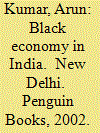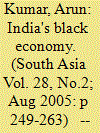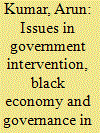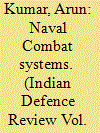| Srl | Item |
| 1 |
ID:
050968


|
|
|
|
|
| Publication |
New Delhi, Penguin Books, 2002.
|
| Description |
xxvii, 354p.
|
| Standard Number |
0143028677
|
|
|
|
|
|
|
|
|
|
|
|
Copies: C:1/I:0,R:0,Q:0
Circulation
| Accession# | Call# | Current Location | Status | Policy | Location |
| 047919 | 330.954/KUM 047919 | Main | On Shelf | General | |
|
|
|
|
| 2 |
ID:
066005


|
|
|
| 3 |
ID:
113570


|
|
|
| 4 |
ID:
156000


|
|
|
| 5 |
ID:
150843


|
|
|
| 6 |
ID:
168817


|
|
|
|
|
| Summary/Abstract |
This article investigates Dalits’ dreams and desires for education in the United Provinces by examining hitherto unexplored records of the American Methodist Church missionaries and the Arya Samaj from the late nineteenth and early twentieth centuries. Focussed on the schools opened for Dalits and Dalit Christian converts by these two religious organisations, it explores the schools’ visions and objectives. The article presents the history of Dalit education beyond the existing dominant analytical frame of educational access and exclusion. It suggests that the mere inclusion of marginalised groups in educational institutions did not guarantee equality; rather, inclusion set in train a process for producing newer forms of exclusion, inequality and suppression. I argue that while these schools opened an important window for Dalit education in the region, the education offered was limited, hierarchical and practical. Both Christian missionaries and Arya Samajis saw Dalits primarily as a labouring community, and the education they offered reflected this thinking; it aimed at making Dalits productive, disciplined and loyal beings. Nevertheless, this limited education allowed Dalits to dream of a literate and dignified life and to pursue non-manual labouring careers.
|
|
|
|
|
|
|
|
|
|
|
|
|
|
|
|